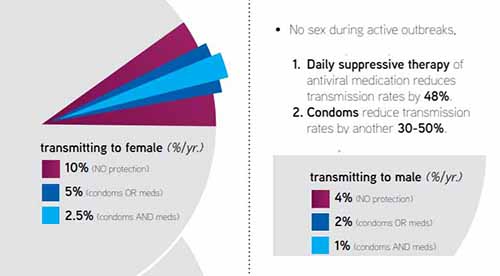How to Prepare a Herpes Talk
Many single people with herpes struggle with when and how to tell a new partner. Before you talk about herpes with a partner, make sure you are prepared to address any misinformation or misconceptions he or she might have. The "herpes talk" requires a little more planning and a lot more education. The more you are prepared, the easier telling him that you have herpes is going to be.

How well informed are you? Do you know the basic steps to reduce the risk to your partner? Do you know the facts about herpes? You want to feel confident and knowledgeable before you can explain the infection to someone else. Be prepared with information from ASHA and other reliable sources.
Learn everything you can about herpes
The most important thing you can do when you're fretting, "how do I tell my partner I have herpes?" is educate yourself about genital herpes and its transmission. That way you can answer any of your partner's questions. You can also refer them to well-researched resources, such the page on our websites, to get answers themselves, and you may even want to have printouts of useful pages such as the herpes overview or the CDC Herpes Fact Sheet.
This will be helpful when you disclose it to current / previous and new partners and answer their question. Confidence and knowledge, learn everything you can. Be a walking encyclopedia. Have herpes of the brain. The more questions you can answer, clearly and with confidence, the better your odds.
Let your partner know the key facts about herpes
Genital herpes is common in the United States. More than one out of every six people aged 14 to 49 years have genital herpes. Around 80% of people infected with genital herpes don't know they have the virus because they have very mild symptoms or none at all.
HSV-1 and HSV-2 are transmitted through direct contact, including kissing, sexual contact (vaginal, oral, or anal sex), or skin-to-skin contact.Genital herpes can be transmitted with or without the presence of sores or other symptoms. It often is transmitted by people who are unaware that they are infected, or by people who do not recognize that their infection can be transmitted even when they have no symptoms.
Herpes will impact your overall health, sex life, and relationships. it also is important to recognize that while herpes is not curable, it can be managed with medication. Daily suppressive therapy (i.e., daily use of antiviral medication) for herpes can also lower your risk of spreading genital herpes to your sex partner.
Women with genital herpes can experience a safe pregnancy and vaginal childbirth. This is especially so when a women has a diagnosis of genital herpes prior to becoming pregnant. In the situation when the mother already has a history of genital herpes, she will have antibodies circulating in her blood which will protect the baby during the pregnancy and delivery.
Step 2: how to keep from spreading herpes to my partner
There is no guarantee of preventing your partner from catching the herpes virus, but taking a few careful steps can really reduce the risk. Tell your partner you can do the following things to lower your chances of spreading herpes:
Always use condoms and dental dams during oral, anal, and vaginal sex. Cut the risks of herpes transmission by up to 30%.
Taking aciclovir will help suppress herpes and will also reduce your chance of passing on the virus to a partner by 50%.
Learn how to tell when an outbreak is coming, and stop having sex right when you notice these signs. You may feel a burning, itching, or tingling feeling that lets you know you’re about to get sores.

More facts on how to explain to future partners what the herpes transmission rates.
Try role-playing with a trusted friend or relative

Experts say that it is best to think through what you’re going to say before the conversation. Choose a neutral setting during a time when you won't be distracted or interrupted. Be natural. Speak with confidence.
Remain calm. If you are upset, a partner might think it is worse than it is. Remember your delivery and body language becomes your message, too. Expect your partner to be accepting and supportive. You re doing the best thing for both of you. People tend to behave as you expect them to.








